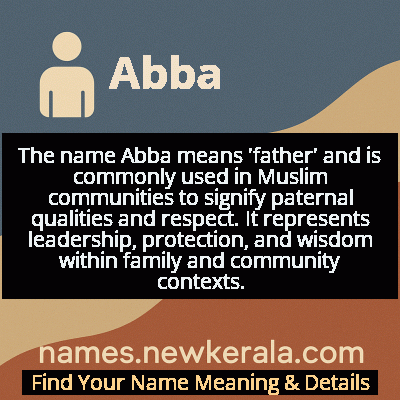Abba Name Meaning & Details
Origin, Popularity, Numerology Analysis & Name Meaning of Abba
Discover the origin, meaning, and cultural significance of the name ABBA. Delve into its historical roots and explore the lasting impact it has had on communities and traditions.
Name
Abba
Gender
Male
Origin
Muslim
Lucky Number
6
Meaning of the Name - Abba
The name Abba means 'father' and is commonly used in Muslim communities to signify paternal qualities and respect. It represents leadership, protection, and wisdom within family and community contexts.
Abba - Complete Numerology Analysis
Your Numerology Number
Based on Pythagorean Numerology System
Ruling Planet
Venus
Positive Nature
Harmonious, responsible, caring, and artistic.
Negative Traits
Overly idealistic, superficial, possessive, or jealous.
Lucky Colours
Pink, turquoise.
Lucky Days
Friday.
Lucky Stones
Diamond, turquoise.
Harmony Numbers
2, 3, 9.
Best Suited Professions
Artists, musicians, teachers, healthcare workers.
What People Like About You
Warmth, nurturing nature, artistic flair.
Famous People Named Abba
Abba Eban
Diplomat and Politician
Renowned Israeli diplomat who served as Foreign Minister and Ambassador to the UN and US
Abba Kyari
Military Officer
Nigerian Army brigadier and military governor who played significant role in Nigerian politics
Abba Siddick
Political Leader
Chadian revolutionary who led the National Liberation Front of Chad
Abba Gumel
Mathematician
Distinguished mathematician known for work in mathematical biology and epidemiology
Name Variations & International Equivalents
Click on blue names to explore their detailed meanings. Gray names with will be available soon.
Cultural & Historical Significance
Historically, the name has been used by various Muslim leaders and scholars, reinforcing its association with authority and respect. In Hausa culture, which has significant Muslim populations across West Africa, 'Abba' is a common given name that often appears in combination with other names, reflecting the importance of paternal lineage. The name also appears in Islamic historical contexts, where figures named Abba contributed to the spread of Islam and establishment of Muslim communities. This cultural heritage makes the name particularly meaningful in Muslim societies where family honor and paternal leadership are highly valued.
Extended Personality Analysis
Individuals named Abba are often perceived as natural leaders who embody strength, responsibility, and protective qualities. They tend to exhibit mature characteristics from a young age, showing wisdom beyond their years and a natural inclination toward guiding others. These individuals typically demonstrate strong decision-making abilities, reliability, and a deep sense of duty toward their family and community. Their personality often reflects the paternal meaning of their name, making them sought after for advice and leadership roles in various settings.
In social contexts, Abbas are known for their calm demeanor, patience, and ability to mediate conflicts. They often possess excellent communication skills and emotional intelligence, allowing them to understand different perspectives and bring people together. While they can be authoritative when necessary, they typically lead with compassion and fairness. Their strong moral compass and consistent behavior earn them respect and trust from those around them. Many Abbas develop into community pillars who support others while maintaining humility and dedication to their principles.
Modern Usage & Popularity
In contemporary times, the name Abba maintains steady popularity in Muslim-majority regions, particularly in West Africa, the Middle East, and South Asia. While it may not rank among the most popular names globally, it holds significant cultural relevance in countries like Nigeria, Niger, Chad, and Sudan where it continues to be a traditional choice honoring paternal values. The name has seen consistent usage rather than dramatic trends, reflecting its status as a classic rather than fashionable name. In diaspora Muslim communities, Abba is sometimes chosen to maintain cultural heritage and religious identity. Modern usage often combines it with other Islamic names, and it remains particularly common among Hausa and Fulani ethnic groups where it preserves linguistic and cultural traditions.
Symbolic & Spiritual Meanings
Symbolically, Abba represents much more than just biological fatherhood—it embodies the concepts of protection, guidance, and foundational strength. The name carries metaphorical weight as a symbol of stability and reliability, much like a father provides the foundation for a family. It represents the bridge between generations, carrying forward traditions, wisdom, and values. In a broader sense, Abba symbolizes authority tempered with compassion, leadership combined with responsibility, and strength paired with nurturing qualities. The name also represents spiritual fatherhood in some contexts, reflecting the relationship between believers and God as the ultimate protector and guide.

